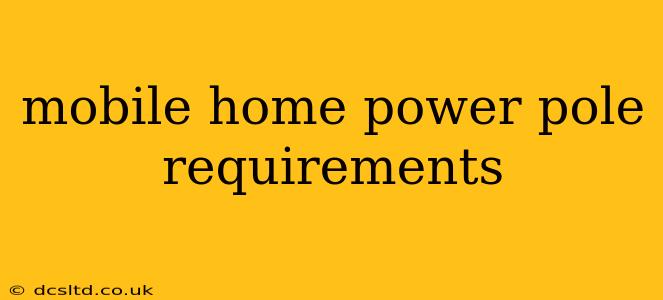Installing electricity to a mobile home requires careful adherence to safety regulations and specific power pole requirements. This guide will cover the essential aspects of ensuring a safe and compliant power connection for your mobile home. Understanding these requirements is crucial for homeowners, contractors, and utility companies alike. Failure to meet these standards can lead to serious safety hazards and potential legal ramifications.
What are the typical power pole requirements for a mobile home?
The specific power pole requirements for a mobile home vary depending on several factors, including your location (local building codes and utility company regulations), the size and electrical demands of your home, and the type of electrical service required (single-phase or three-phase). However, some common elements generally apply:
Pole Height and Strength:
The power pole must be tall enough to provide adequate clearance above the ground to prevent accidental contact and to accommodate the necessary wiring. The strength of the pole must be sufficient to withstand the weight of the wires, transformers (if applicable), and potential environmental stresses such as wind and ice. Local building codes dictate minimum height and material requirements.
Service Drop and Wiring:
The service drop is the overhead wiring that runs from the power pole to your mobile home's electrical meter. This wiring must meet specific gauge and insulation standards to handle the anticipated electrical load. The type of wire (e.g., aluminum or copper) will also be specified based on local regulations and safety codes. Proper installation of grounding wires is crucial for safety.
Transformer Size (if required):
Depending on your home's power needs and the voltage supplied by the utility company, a step-down transformer might be installed on the pole to reduce the voltage to a safe level for household use. The transformer size is calculated based on the expected energy consumption of your mobile home.
Meter Socket and Installation:
A properly installed meter socket is essential for safe and accurate measurement of electricity consumption. The meter socket must be securely attached to the pole or a suitable mounting location and meet all relevant safety standards. Access to the meter should be easy and safe for utility company personnel.
Grounding:
Adequate grounding is crucial for electrical safety. The power pole, service drop, and mobile home's electrical system must be properly grounded to protect against electrical shocks and equipment damage. Ground rods driven deep into the earth are typically used to establish a reliable ground connection.
How much does it cost to install a power pole for a mobile home?
The cost of installing a power pole for a mobile home varies significantly depending on location, distance from existing power lines, the complexity of the installation, and the specific requirements of the job. Factors like the need for a new transformer, the length of the service drop, and the type of pole material will influence the final cost. You'll need to obtain quotes from multiple contractors familiar with mobile home electrical installations in your area.
Who is responsible for the cost of the power pole installation?
Typically, the responsibility for the cost of power pole installation falls on the homeowner. However, there might be exceptions in specific situations, such as when the mobile home is located in a new development where the developer is responsible for the infrastructure. Contact your local utility company to clarify the responsibility for the cost of the power pole and related infrastructure in your situation.
What permits and inspections are required for mobile home power pole installation?
Before starting any power pole installation project, you must obtain the necessary permits from your local authorities, and these will vary by area. Inspections by qualified electricians and utility company representatives are usually required at various stages of the installation process to ensure compliance with safety regulations and building codes. Failure to comply with permit and inspection requirements can result in fines and delays. It’s crucial to verify the required documentation before you start the installation process.
What are the safety regulations involved in mobile home power pole installation?
Safety is paramount in all electrical work. Only qualified and licensed electricians should undertake the installation of a power pole and its associated wiring. Adherence to the National Electrical Code (NEC) and any applicable local codes is mandatory. Proper use of personal protective equipment (PPE), including insulated gloves and safety glasses, is crucial to prevent electrical shocks and injuries.
Remember, this information is for general guidance only. Always consult with your local utility company and qualified electricians to determine the precise power pole requirements and procedures for your specific situation. Safety should be the top priority during any electrical installation project.
